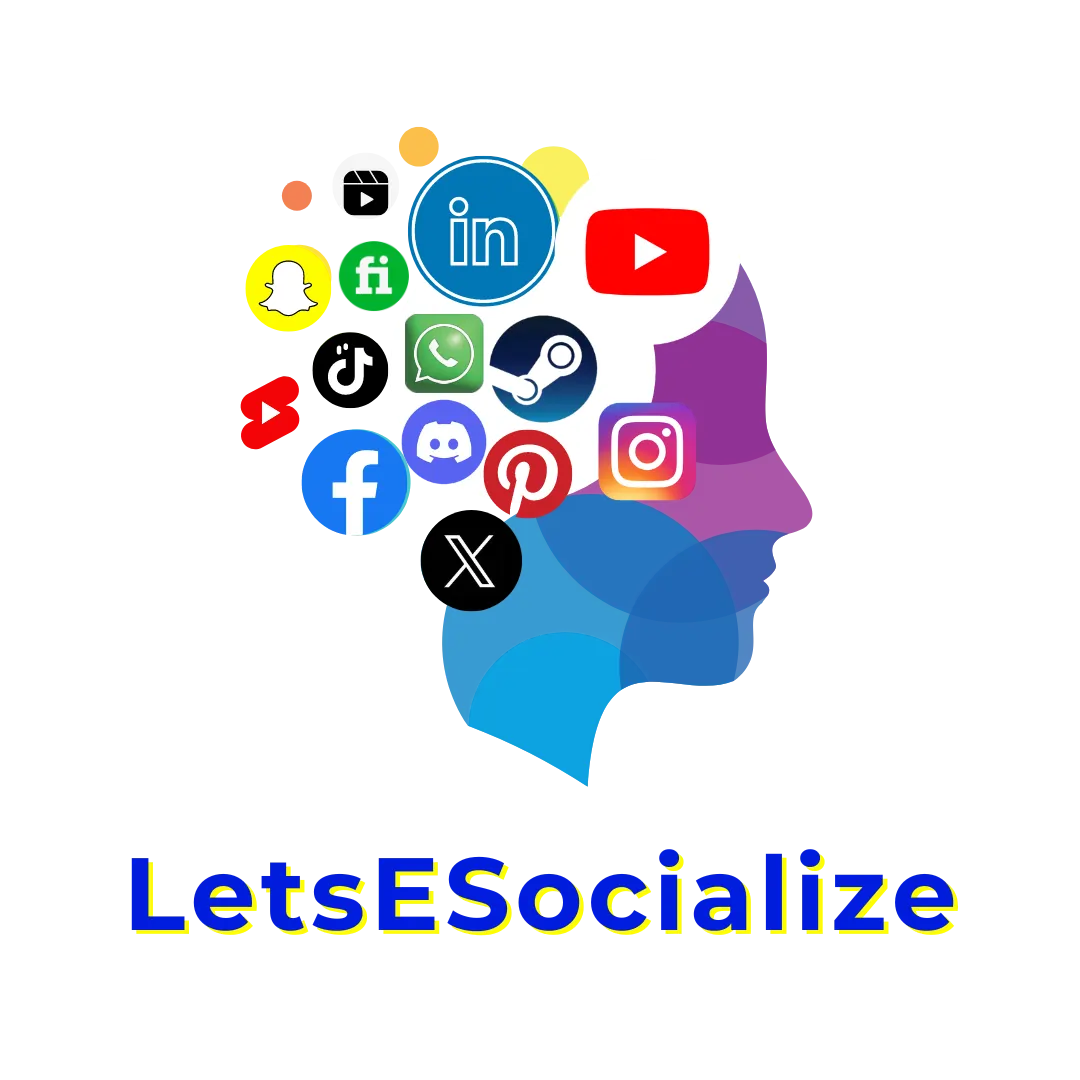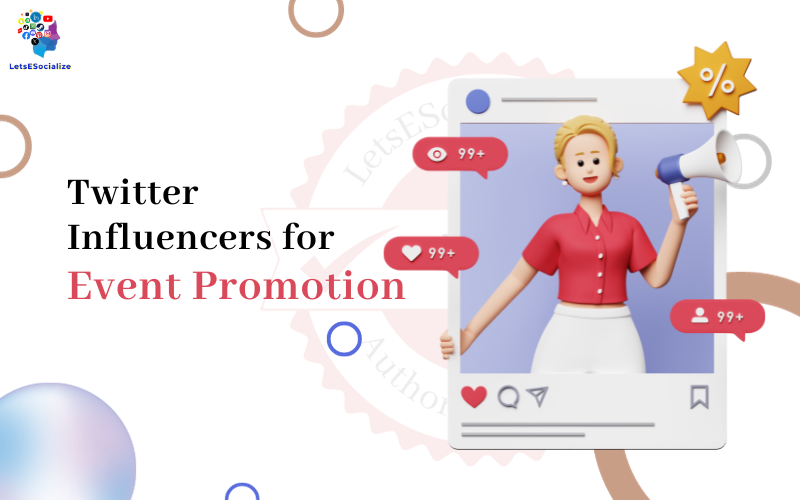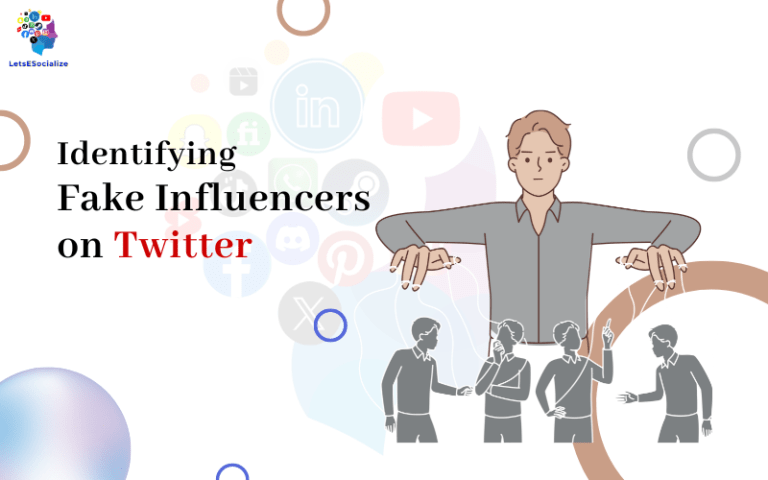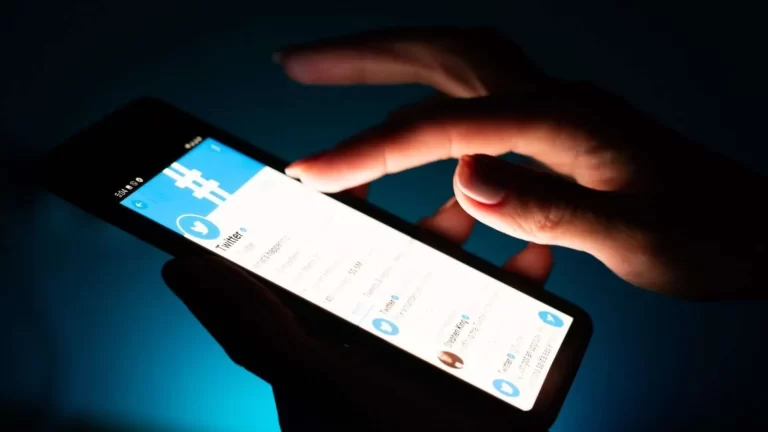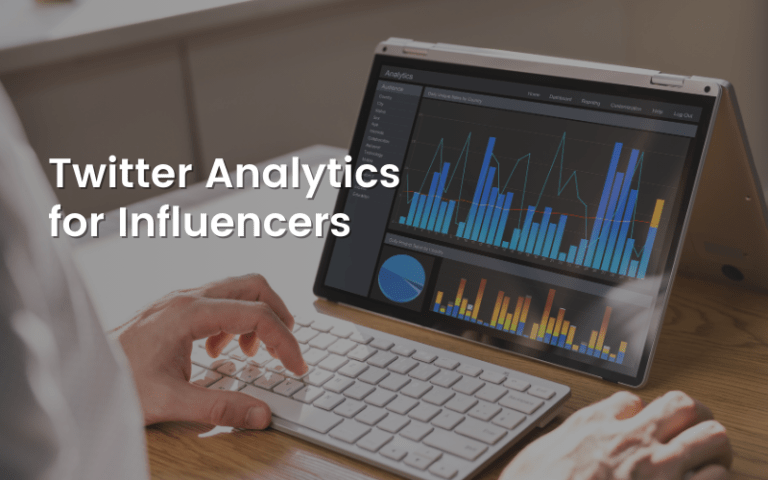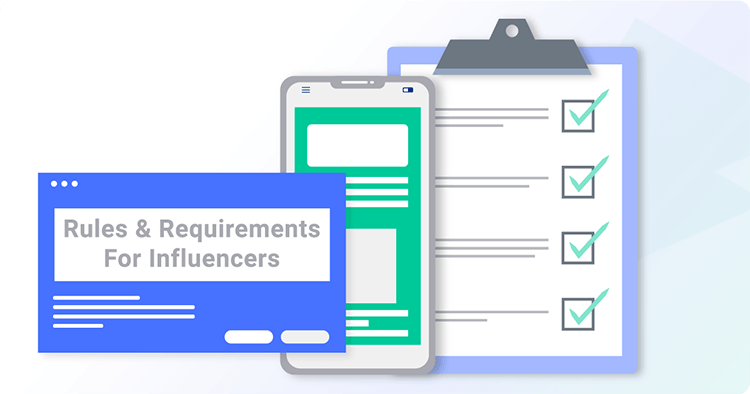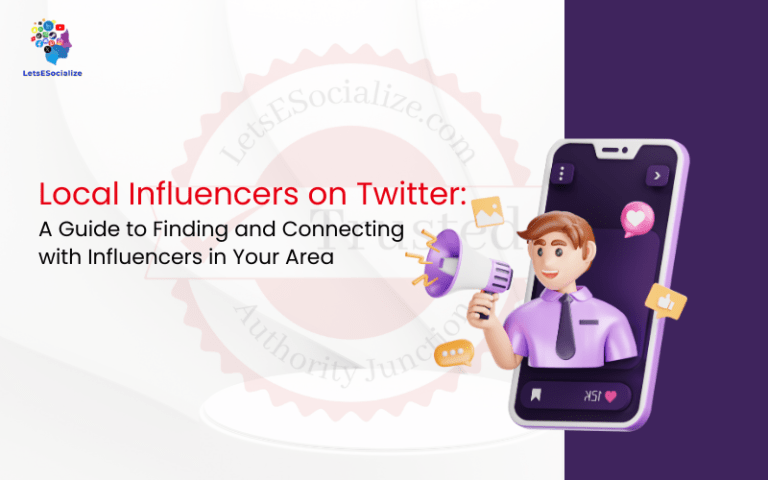Twitter has become a pivotal platform for influencer marketing and event promotion in recent years. With its real-time nature and engaged user base, Twitter provides immense opportunities for brands to collaborate with influencers to generate buzz and attendance for their events.
Let’s explore how brands leverage Twitter influencers for event promotion, from product launches to conferences. We’ll look at effective influencer marketing strategies, top events using Twitter influencers, and measurement.
Table of Contents
The Rise of Influencer Marketing for Events on Twitter
Twitter has proven itself as a critical channel for event marketing campaigns with influencers. Here are some stats on its growth:
- 78% of brand marketers used influencer marketing for event promotion in 2022
- 65% say Twitter delivers the best ROI for their influencer campaigns
The average Twitter engagement rate for influencer event posts is 5.3% - Tweets with #ad or #spon increased by 22% in 2022, indicating sponsored influencer content
Several factors contribute to Twitter’s strength for influencer event marketing:
- Timely Engagement – Twitter’s real-time updates allow influencers to generate buzz around events as they occur.
- Targeted Reach – Twitter’s interest-based communities help influencers precisely target niche audiences that will care about specific events.
- Trending Discovery – Event hashtags can organically trend on Twitter, expanding the Reach beyond just an influencer’s followers.
- Multimedia Content – Videos, GIFs, images, and more help influencers deliver engaging event teasers.
- Measurable Results – Trackable metrics like impressions, engagement, and hashtag analytics allow brands to quantify campaign impact.
As Twitter usage surges for event marketing, brands have invested more resources into optimizing partnerships with influencers on the platform.
Most Popular Events Using Twitter Influencers
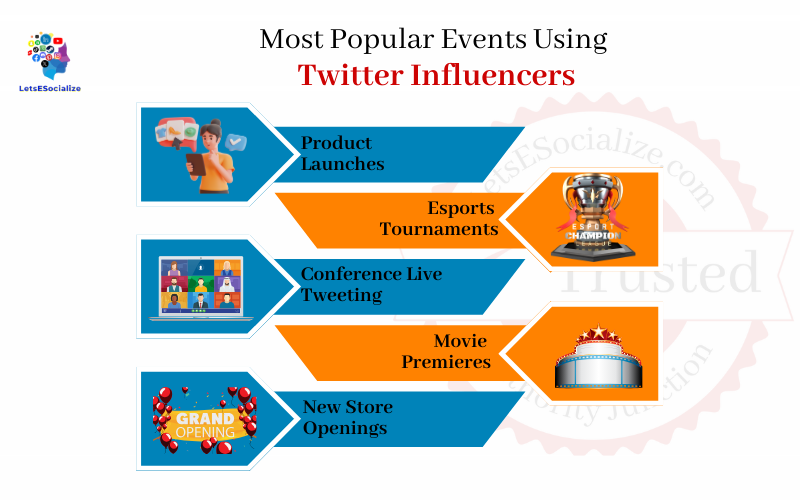
Influencers on Twitter have been deployed for event promotions across every industry. Here are some top examples:
Product Launches
When Apple releases new iPhones or iPads, influencers often attend launch events and tweet teasers, hands-on demos, and specs from the announcement. This builds product hype rapidly on launch day.
Esports Tournaments
Esports influencers tweet updates through tournaments for games like Fortnite, Valorant, and League of Legends. Their commentary, behind-the-scenes footage, and banter keep fans engaged.
Conference Live Tweeting
At tech conferences like CES, influencers are often hired to live tweet keynotes and breakout sessions. This extends the Reach beyond physical attendees.
Movie Premieres
Entertainment influencers get early access to preview upcoming movies and tweet reviews, reactions and photos from red-carpet premieres. This generates a wider opening week buzz.
New Store Openings
When brands like Target, Sephora and Apple open new stores, they’ll enlist influencers from that region to visit, post about the location and spread the word.
These examples illustrate Twitter’s versatility for different event types and industries. Brands seek to drive awareness, engagement and attendance through influencer partnerships.
Strategies for Influencers Promoting Events on Twitter
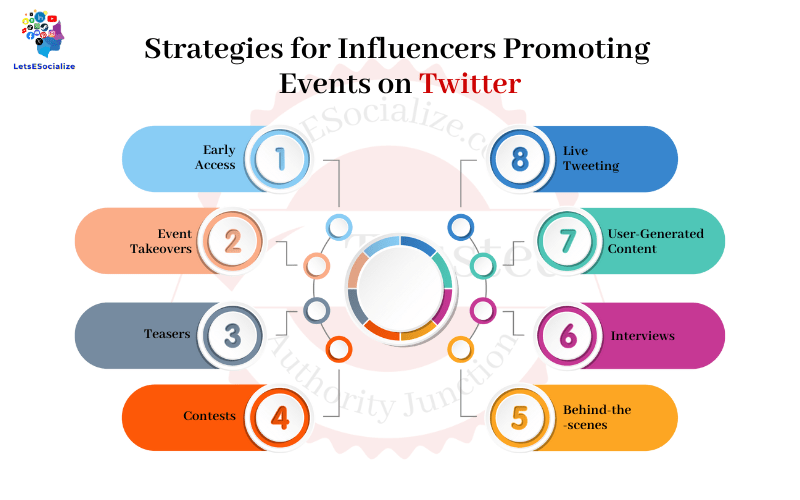
To succeed in influencer marketing around events, brands must empower influencers with creative freedom while setting clear expectations. Here are some successful strategies:
Early Access – Give influencers VIP access to get photos, videos, and details before the public. This exclusive content piques interest.
Event Takeovers – Have influencers take over the brand’s Twitter account during an event for real-time updates.
Teasers – Influencers can post teasers and reminders in the weeks leading up to an event to gradually build anticipation.
Contests – Influencers promote giveaways for free event tickets, VIP access, or merchandise. This incentivizes their audience to engage.
Behind-the-scenes – Candid event content like rehearsals or setup gives followers a unique look compared to mainstream coverage.
Interviews – Influencers can interview event speakers, organizers, attendees, and brands for unique Q&As.
User-Generated Content – Influencers encourage attendees to tag the event hashtag to amplify user photos.
Live Tweeting – Posting commentary, reactions, and highlights in real-time makes remote audiences feel included.
When executed well, these tactics deliver authentic yet strategic event promotion from voices followers already trust – the influencers.
Also read: Strategies for Influencer Marketing on Twitter
Measuring Influencer Event Campaigns on Twitter
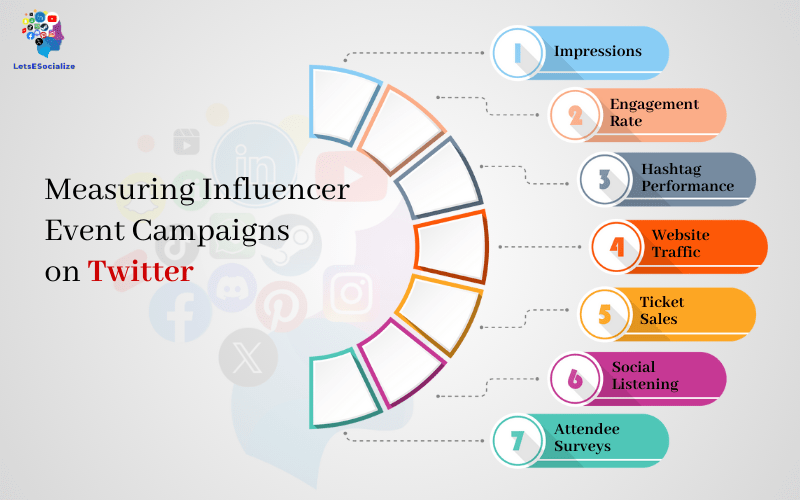
To determine the ROI of influencer event promotions, brands should track metrics like:
Impressions – Total number of times influencer event tweets were seen. High impressions indicate broad Reach.
Engagement Rate – Likes, retweets, clicks, etc., divided by total impressions. Engagement indicates content resonated.
Hashtag Performance – Volume and reach of the event hashtag and related hashtag trends.
Website Traffic – Tracking traffic from influencer tweets containing event links.
Ticket Sales – For paid events, track sales lifts after influencer promotions go live.
Social Listening – Monitoring brand mentions, sentiment, and conversation topics around the event.
Attendee Surveys – Ask event attendees if/how influencer promotions impacted their awareness and decision to attend.
Analyzing these metrics gives tangible data on how effectively influencers shaped event success and engagement on Twitter.
Twitter’s Influencer Marketing Analytics Tools
To simplify campaign measurement, Twitter has launched analytics tools natively within its Ads Manager platform:
Campaign Manager – Tracks campaign performance and engagement metrics across multiple influencers in one dashboard.
Audience Insights – Provides demographic data like interests and purchasing intent on an influencer’s audience.
Engagement Insights – Detailed data on tweets resonating most with an influencer’s followers.
Pricing & Budgeting Tools – Estimate the potential Reach and cost of sponsoring influencer tweets for your campaign budget.
Integrated campaign reporting eliminates manual data aggregation. Brands gain helpful insights to guide current and future influencer collaborations on Twitter.
Also read: Twitter Analytics for Influencers
Top Twitter Events Using Influencer Marketing
Here are some real examples of significant events that drove success through influencer marketing on Twitter:
1. Samsung Galaxy Unpacked
Each year, Samsung leverages Twitter influencers to build hype for their new Galaxy phone reveal. At their 2022 Unpacked event, Samsung reported:
- 4.3 million Twitter users tuned into the livestream
- #GalaxyUnpacked trended #1 worldwide with 1.8 million tweets
- 8.1 billion Twitter impressions about the event
They attributed this level of viral engagement primarily to their influencer program and content exclusives.
2. Prime Day 2022
Amazon’s annual Prime Day shopping holiday enlisted over 500 influencers globally on Twitter to promote discounts and products. Results showed:
- Tweets drove a 4.5% increase in Prime Day sales year-over-year
- #PrimeDay trended for 55 hours straight worldwide
- 56% of shoppers said Twitter influencers impacted their purchasing decisions
This helped make Prime Day 2022 Amazon’s most significant event ever.
3. E3 2021
Twitter collaborated with gaming influencers for virtual events and content for the major Electronic Entertainment Expo (E3) gaming convention in 2021.
- E3 2021 saw a 38% increase in gaming-related tweets from the previous year
- The #E32021 hashtag generated over 10 million impressions
- Twitter hosted live streams with gaming influencers playing upcoming releases
This engagement helped brands showcase upcoming games, even with E3 being a virtual event.
Latest Twitter Influencer Marketing News & Trends
Here are some recent news stories demonstrating how Twitter influencer marketing for events continues to evolve:
- Twitter introduces new branded content formats like Twitter Polls and Twitter Cards to integrate seamlessly into influencer event promotions.
- Calvin Klein’s #CKPARTNER campaign for New York Fashion Week surpasses 125 million Twitter impressions in a single week through influencer content.
- 84% of marketing professionals plan to increase their Twitter influencer marketing budgets in 2023.
- Twitter tests ticketed live audio events to provide new monetization streams for influencers promoting virtual events.
- A study finds using gaming influencers on Twitter increases esports tournament viewership by an average of 16%.
- Twitter expands its tipping feature to all users, making it easier for brands to pay influencers for promoted event tweets.
- Popular beauty influencers drive a 185% sales increase for Fenty Beauty’s virtual product launch event through Twitter campaigns.
As metrics demonstrate performance, brands will continue embracing Twitter influencers as a channel to authentically promote events to engaged niche audiences. The platform’s capability to generate real-time buzz will cement its status as a go-to for event marketing.
Conclusion
Thanks to Twitter’s real-time, conversational nature, influencer marketing has become a driving force for successful event promotions across every industry. By partnering with niche influencers with target audiences, brands can cut through the noise leading to events.
Twitter provides unrivalled opportunities for brands to collaborate with influencers and spread event information authentically and engagingly. As more marketers quantify the impact through metrics like impressions, engagement and sales, budgets for Twitter influencer event campaigns will keep growing.
While the tactics will evolve with new social media trends and tools, Twitter’s fundamental strengths make influencer marketing an event promotion strategy that is here to stay. Brands that learn to effectively leverage influencer partnerships will gain a competitive edge in generating buzz for their events.
